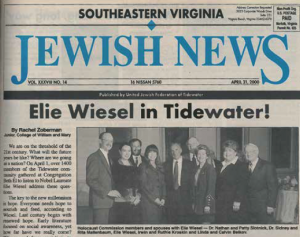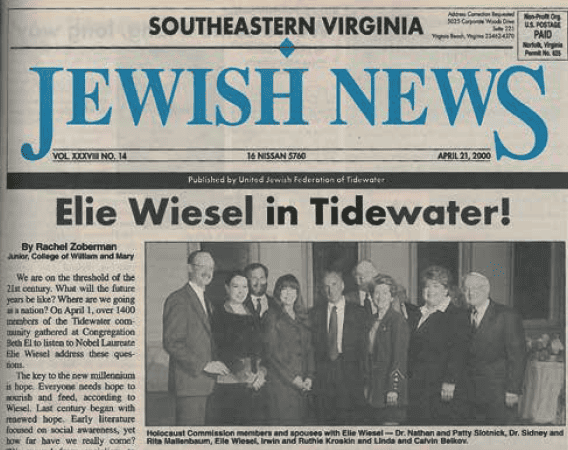 Like so many of members of our community, I had the honor of hearing Elie Wiesel speak at ODU’s Ted Constant Convocation Center in March 2006. Always the conscience of his generation, Wiesel lamented how little humanity had changed since the Holocaust. Wondering aloud, he said: “There is racism in many parts of the world, fanaticism—my God, haven’t we learned? Here we are now in 2006, with new threats and old anguish.”
Like so many of members of our community, I had the honor of hearing Elie Wiesel speak at ODU’s Ted Constant Convocation Center in March 2006. Always the conscience of his generation, Wiesel lamented how little humanity had changed since the Holocaust. Wondering aloud, he said: “There is racism in many parts of the world, fanaticism—my God, haven’t we learned? Here we are now in 2006, with new threats and old anguish.”
“…Can we change the world?” he asked at one point.
“I don’t know. I don’t think it’s possible to change the world unless the world wants to change.” How prophetic as ever his words are today, 10 years later.
I’ve always felt close to Elie Wiesel. He was from a small town in Transylvania, not 20 minutes away from where my father was born and raised. He was the same age as my dad as well, which meant they were taken by the Nazis at the same time and had many similar experiences in the same concentration and slave labor camps. Yet because my dad could not speak of the horrors he witnessed, Elie Wiesel’s accounts were, for me, not just witness to our Jewish people’s history, but also mirrors to my family’s personal tragedy.
When I read Night, I was haunted by his words: “Never shall I forget that night, the first night in camp, which has turned my life into one long night, seven times cursed and seven times sealed . . .Never shall I forget those moments which murdered my God and my soul and turned my dreams to dust. Never shall I forget these things, even if I am condemned to live as long as God Himself. Never.”
Yet I was also inspired by them to do all that I could, personally and professionally, to make certain that injustice was never again allowed to reign without protest. It was he who challenged me, and all of us, so eloquently that “we must always take sides.” “Neutrality helps the oppressor, never the victim,” he said. “Silence encourages the tormentor, never the tormented.” I am certain that becoming a rabbi was nothing less than a fulfillment of his call to action.
As I struggled with my theology—with how an all good, all knowing and all powerful God could allow such evil to be perpetrated against His creations—I found my answer in his account of having to bear witness to men who had just been mercilessly beaten and hung before his very eyes. When the man behind him choked out the words: “For God’s sake, where is God?” From within him, Wiesel heard a voice answer: “Where He is? This is where—hanging here from this gallows..” To some this meant that God was dead. But to me, I understood that while God could not stop people from exercising inhumanity, God could be with us, and comfort us even in the Valley of the Shadow.
As my personal theology developed, I came to believe that God should and could have done more to save our people. Yet, why He didn’t, and often still doesn’t, distresses me still. Unto today, it is again, Elie Wiesel’s answer to the many similar contradictions with which he wrestled that I turn. He said, in the face of so many horrors in our world then and now: “I pray to the God within me that He will give me the strength to ask Him the right questions.”
Yet even so, it was his vision for humanity and hope for the future that shaped my life most of all. In spite of everything, he still believed that our anecdote to despair was our duty to reject it; that we had a choice as human beings whether to follow our instincts to destroy or our inclination not to; that, even when we lose, victories of the soul and spirit are victories; and that peace is our gift to each other and always possible. His faith, his strength, his gratitude and his hope are a beacon of what could and might still be.
I have always said that what awed me about my dad’s survival were not the many miracles that enabled him to live through the camps and death march, but rather, that, in spite of his experience, he was willing to love again, to bring children into this world, and to raise us to be good people who take responsibility for our actions and do our part to ensure a just world. Elie Wiesel did that of all of God’s children. His memory is for all of us a blessing.
—Rabbi Rosalin Mandelberg serves as Senior Rabbi of Ohef Sholom Temple. She is a second-generation Holocaust survivor.

